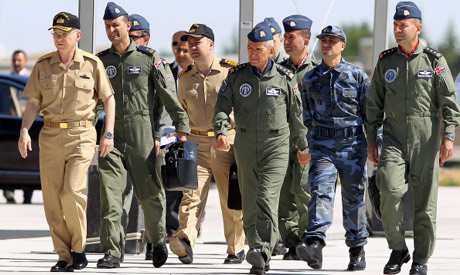
Turkish air force commanders arrive before Turkish Stars, Turkish army's aerobic team perform with their supersonic jets over a military base in Konya, Turkey, Tuesday, June 19, 2012. (Photo: AP)
Fighting between soldiers and Kurdish rebels in southeast Turkey killed 26 people Tuesday, threatening to torpedo a rare opening for negotiations to resolve a decades-old separatist conflict.
Eight Turkish soldiers and 18 rebels were killed and another 16 soldiers wounded following an attack by rebels on an army post near the border with Iraq, local officials said in a statement.
Ten of the rebels belonged to the outlawed Kurdistan Workers' Party (PKK), said officials.
Turkish Prime Minister Recep Tayyip Erdogan swiftly condemned the attack, saying that government forces would continue to battle the rebels.
"We will continue our fight to the end. Sooner or later we will succeed," he told Anatolia news agency from Mexico, where he is attending the G20 summit at Los Cabos.
"Nobody can use terrorism to negotiate," he said, adding that the only solution was for the "terrorists" to lay down their arms.
The bloodshed comes amid signs of a softening of the government's hard line against the PKK after a prominent Kurdish lawmaker extended an olive branch to Erdogan.
Leyla Zana, in an interview with the prominent daily Hurriyet, praised Erdogan as the head of the strongest government in Turkey's history, saying that with the political will, he had the power to solve the Kurdish problem.
"The strongest one can halt all this if he wants. Who's that strongest one? It's the current government and its head Recep Tayyip Erdogan," she told Hurriyet.
Zana, among the most outspoken advocates of Kurdish rights who won the European Parliament's Sakharov human rights award in 1995, was imprisoned from 1994 to 2004 for alleged links with the separatist PKK, which took up arms in 1984, sparking a conflict that has claimed some 45,000 lives.
But her latest comments won plaudits from government officials and Erdogan said he was ready to meet her.
The headline-grabbing interview however drew a harsh response from the pro-Kurdish Peace and Democracy Party (BDP), which secured 29 seats in the 550-member Turkish parliament in the 2011 elections last year.
The party's co-chairman Selahattin Demirtas accused Zana of being "naive" to pin her hopes on Erdogan.
Meanwhile the main opposition Republican People's Party (CHP) drew up a blueprint that would see a parliamentary commission work together with an outside panel of "wise men" to resolve the Kurdish problem.
The plan has won backing from both the Erdogan government and Kurdish MPs, seen by political analysts as a "watershed" in Turkish politics.
In another sign of softening, Erdogan told parliament last week that the Kurdish language would be taught as an elective course in public schools for the first time ever.
Since coming to power in 2002, Erdogan's government has carried out a number of reforms under pressure from the European Union, easing restrictions on the use of Kurdish, including in broadcasts.
Political commentators however warn that a spike in violence in the southeast, home to most of Turkey's large Kurdish minority, may force the government to keep military option on the table.
The fresh violence prompted Turkey's top commander General Necdet Ozer and cabinet ministers to travel to the region, while President Abdullah Gul said Turkey must "solve the terrorism problem without making any concessions on its state authority and rule of law."
The PKK is listed as a terrorist organisation by Turkey and much of the international community.
Short link: